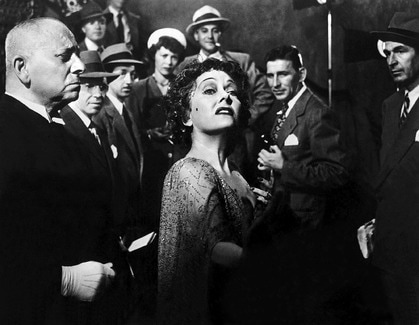A- | A fading actress clings to her stardom. Directed by Billy Wilder Starring Gloria Swanson and William Holden Initial Review by Chris Cook |

Ranked number 12 on the American Film Institute’s list 0f 100 best American films in 1998, and coming in at 16th on the 2008 list, Sunset Boulevard continues to stand up as a cinematic classic.
The film opens up with a dead body floating face down in a swimming pool. This was recently given a nod in the first episode of season seven of Archer.
The film is narrated by Joe Gillis (William Holden), a struggling screenwriter whose ideas get rejected and his car is threatened by repossession. While running from the repo men, he stumbles upon a run-down mansion, the home of washed-up actress Norma Desmond, played brilliantly by Gloria Swanson. Once learning that he’s a writer, she coerces Joe to move into her home and assist with fixing her intended comeback film script (think Stephen King’s Misery without the hacking off of limbs with an axe).
Joe eventually begins to sneak out of the house in the evenings to see Betty Schaefer (played by Nancy Olson), a script reader at Paramount who’s engaged to Joe’s friend, Artie. She has found potential in a scene from one of Joe’s scripts and wants to write the adaptation. The two of them wind up falling in love, which doesn’t settle well with Norma, especially after discovering the script they’re working on.
She proceeds to threaten to kill herself—for a second time; she slashes her wrists earlier in the film on New Year’s Eve after Joe left the elaborate party she threw just for the two of them—and ends up shooting Joe, who becomes the floating corpse in the pool seen in the opening. As the police officers and media arrive on the scene, the delusional Norma believes it’s the film crew arriving to film her comeback movie.
I enjoyed this film noir. It’s considered one of the best movies about the film industry; several high-name performers appearing as themselves—Cecil DeMille, Buster Keaton, and H.B. Warner, to name a few. Even being from the 50s, it brings up the concept of the media and reporting what’s relevant in the world. Great story, great acting. It had drama, comedy, romance, a car chase, a funeral for a monkey, and in my opinion, nearly 70 years later, it still stands up as one of the greats. A on this one.
 RSS Feed
RSS Feed